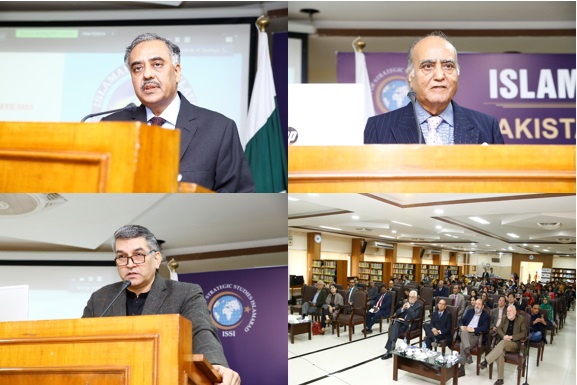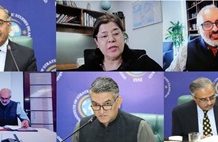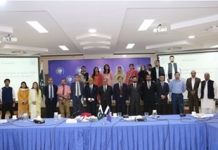Islamabad Conclave-2023
“Pakistan in a Changing World”
December 6-7, 2023
Press Release
Day 2
Concluding Plenary

The Institute of Strategic Studies Islamabad (ISSI) concluded its 2-day annual flagship event, “Islamabad Conclave 2023,” today. DG ISSI Ambassador Sohail Mahmood presented the key takeaways from the 5 Working Sessions.
Highlighting the takeaways of the first working session, he reiterated that the emerging global landscape is marked by the expansion of alliances, collapsing existing arms control regimes, nuclear modernisation, militarisation of outer space, cyberspace, artificial intelligence, and biotechnologies. Strategic stability is constituted by a stable equilibrium where: there is no incentive to go to war; there is little temptation for arms race and equilibrium will be least affected by technological or political development. Strategic stability in South Asia is adversely affected by Indian actions on all these accounts. The new Indian construct of ‘Southern Asia’ has sought to change the dynamics of strategic stability in South Asia by trying to drag China into an existing Pakistan-India equation.
While elucidating the key takeaways of the second working session he stated that achieving stability in Afghanistan necessitates a comprehensive approach, considering the exodus of the educated class from the country with a focus on effective humanitarian aid utilization, shift to a livelihood-focused model and women inclusion in Afghanistan. The renewed focus on the Palestinian issue is hindering any potential advancement toward normalization with Israel. The Middle East faces a stark choice: pursue a comprehensive, long-term solution for peace and stability, or risk escalating violence and crises with catastrophic humanitarian consequences.
Moving on to the third session’s takeaways he stressed that the China-Pakistan Economic Corridor (CPEC), is framed as a transformative project, catalyzing Pakistan’s economic revitalization and as an enabler for building capacity and meeting fundamental needs. In the same manner, geo-economics, a component of national security through economic security requires a national consensus achieved through open debates within the country. Prerequisites include political stability, rule of law, anti-corruption measures, macroeconomic stability, economic diversification, public-private partnerships, trade facilitation, and energy, social, and environmental sustainability.
Touching on the highlights of the fourth working session, Ambassador Mahmood reiterated uncontrolled population growth as a significant threat, emphasizing the need for proper population management strategies. Pakistan requires fundamental transitions in policymaking, finance, and institutions for comprehensive security, moving away from conventional approaches. Pakistan also needs to invest in human capital. To harness the youth bulge, Pakistan needs transformative policies, departing from the unsustainable business-as-usual approach of the past seven decades. To attain sustainable development goals, Pakistan should transition from the ‘do more’ approach to a strategy of ‘doing ourselves,’ involving national will and ownership.
In the same manner, reiterating takeaways from the last session Ambassador Mahmood elucidated that rivalry between major powers and emerging nations mirrors Cold War-era bloc politics, limiting foreign policy flexibility. Pakistan must navigate relations judiciously, safeguarding national interests. Global contestation impacting South Asia: U.S.-China rivalry, Russia-China alliance, Middle East tensions, and India’s role influenced by U.S. support for Modi’s Hindu nationalist state. The conflict-ridden world demands global unity. Unaddressed nuclear risks and disruptive AI emphasize existential threats, requiring mitigation. Amidst a fluid and unpredictable global landscape, the changing world order enables the ‘Global South,’ including Pakistan, to engage for economic interests. The shift towards a post-Western era is evident, emphasizing the importance of shared interests over values and encouraging multilateral and ‘mini-lateral’ approaches.
Presenting his vote of thanks, Ambassador Khalid Mahmood, Chairman BoG, ISSI stated that the proceedings of the Conclave brought attention to Pakistan’s future strategic blueprint. It made a valuable contribution to identifying the humongous challenges that Pakistan faces. He thanked the keynote speakers as well as panellists of all the sessions, and extended appreciation to the team of ISSI in making the Conclave a success.
The Conclave was attended by participants belonging to diverse fields including academia, civil society, think-tank community, policy practitioners, diplomatic corps, students, and the media.











